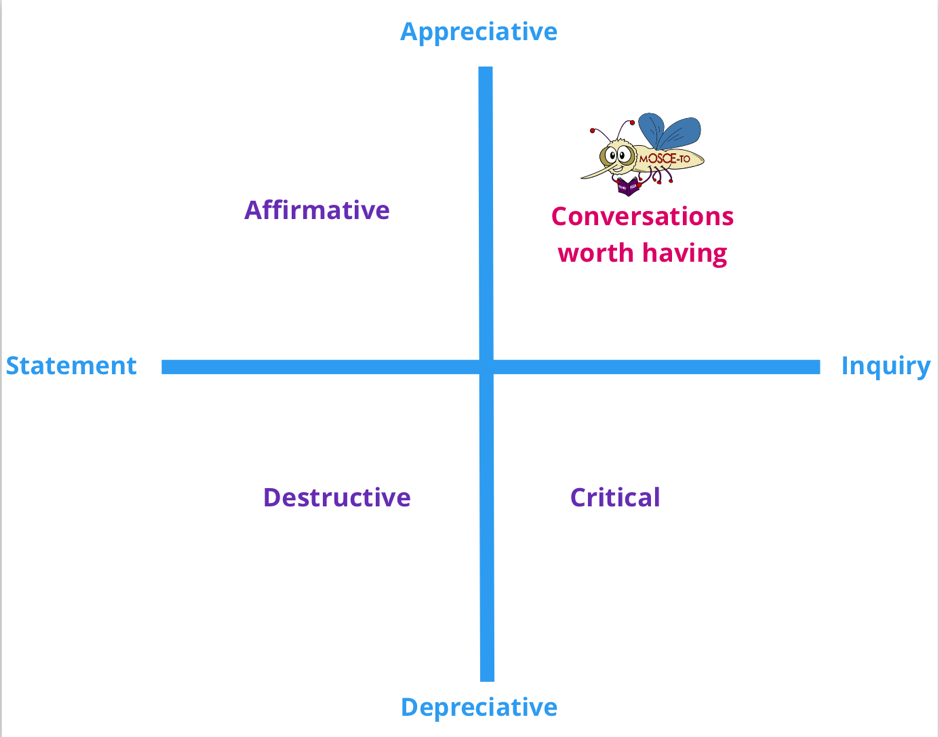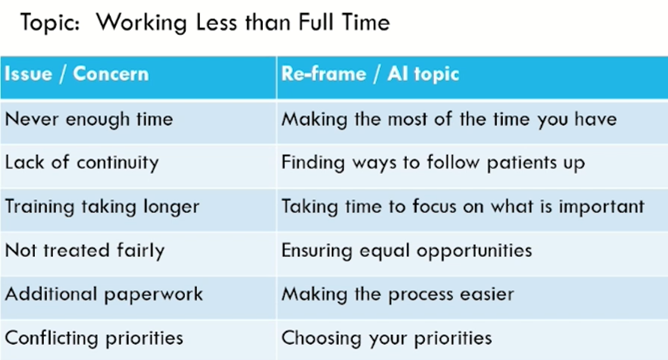Appreciative Inquiry - a sustainable approach to development (5 min read)
This concept was first introduced to me by Dr. Emma Plunkett at the most recent Association of Anaesthetists’ Trainee Conference 2021.
It’s an excellent principle you can apply to your life - both inside and outside of work.
“Good things happen when you approach issues with a different mindset”
What we will cover:-
What is Appreciative Inquiry?
The types of conversations and how they can influence outcome
3 easy ways to implement AI into your practice
Moving forward with AI
Summary
1.What is Appreciate Inquiry? (AI)
Appreciative – when something “appreciates” it increases in value
Inquiry – “seeking to understand through questioning”
It is a tool for personal and organisational development through inspiring a sustainable approach to change.
AI recognises that:
1. Humans are naturally negative
2. Positives are easily overlooked
AI focuses on “conversations worth having…”
These are shown in the table below
“Conversations worth having” can only happen when we embrace curiosity and gratitude
2. By thinking about the content of our conversations, we can alter our conversations for growth and development.
If we think about the types of conversations we have on a scales of depreciative → appreciative and statement → inquiry we can see how TYPES of conversations can influence outcomes.
How the type of conversation can influence outcomes:
Depreciative + Inquiry based conversations = Critical conversations
These can be viewed negatively. This may be necessary at certain times such as critical appraisals of journals. What are its limitations? What conclusions can be drawn overall given its strengths and limitations?
Depreciative + Statement based conversations = Destructive conversations
These can be destructive and harm relationships i.e. criticising someone on something they have done without providing reasoning/suggestions for positive change.
Appreciative + Statement based conversations = Affirmative conversations
These do not promote development but can help in the short-term with self-esteem i.e positive reinforcement through thanking colleagues for their hard work during the day, or commending someone on a job well done
Appreciative + Inquiry based conversations = “Conversations worth having”
These promote personal and organisational growth. When we appreciate and inquire, we allow our conversations to make an impact.
Positives are acknowledged and difficult situations are explored in a collaborative manner -
“How can we do even better, together?”
3. How do we implement AI into our daily practice?
Here’s 3 EASY steps to help you use AI
Step 1: Get to know the guiding principles
Here are the guiding principles taken from the conference to help get you started:
In every situation something works…find it and let it flourish
What we focus on becomes our reality
There are always multiple realities – different ways of seeing
The way we ask questions either creates or denies possibilities
The language we use creates our reality
Our future should be created from the best of our old ways
Value differences – diversity nourishes creativity and resilience
Step 2: Reframe your mindset
Here is an example below used at the conference looking at the challenges posed to people working less than full time:
Reframing has the power to change the way you process things
Step 3: Begin having appreciative conversations
These focus on structured reflective conversations:
What worked/went well and why?
How we felt/feel now
How we’d like to do things
How things could be better
How to make them happen
4. Moving forward:
AI can be used everywhere
Use it to help with your own personal development journey - start a gratitude journal, frame your PDP’s, shape conversations during supervisory meetings and implement AI into quality improvement practices.
5. Summary:
1. Appreciative inquiry involves acknowledging what is working well and what could be improved.
2. It is a developmental tool which can help reframe ideas, mindsets and influence positive outcomes.
3. Utilising the AI framework in your day to day practice can help you to benefit from the conversations really worth having.
The way we ask questions either creates or denies possibilities
Personally, this underpins AI and how it can help us to shape improved outcomes for ourselves and our teams
Next time you are in conversation with someone, see what happens when you use AI.
What is your take home message? Do you use Appreciative Inquiry?
Comments welcomed below :)
Want to know more?
www.learningfromexcellence.com
https://appreciatingpeople.co.uk
References
Adapted from presentation “Appreciative Inquiry” by Dr Emma Plunkett, presented at Trainee Conference 2021, Newcastle, Association of Anaesthetists, 8th July 2021.
We do not claim to own any of the images displayed on this post . This is our interpretation of AI and we are not affiliated to any of the links posted.



